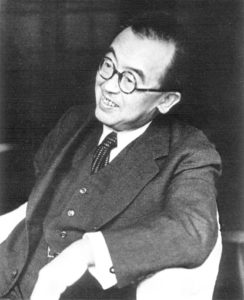Ms. Kaneko, my former French teacher who I mentioned in a previous post, one day mumbled, “Upon getting the ‘Standard French-Japanese Dictionary,’ one should start by reading the foreword. It can’t be read without tears.”
Indeed, unlike the foreword of a usual dictionary, this one does have some profound lines:
The predecessor of this dictionary, “Standard French-Japanese Dictionary” was published about 30 years ago in May 1957. Under what situation the editing of this dictionary has been done is found in detail in the introduction given by the late professor Shintaro Suzuki:
In 1945, Tokyo was completely burned to the ground in air raids, and after the war ended, we entered a chaotic time. I extended what little was left of the library by 15 tsubo (approx. 50 m2) and was cooped up in the room day after day, feeling depressed about the situation. Then, I was paid a visit by Mr. Ippei Suzuki, the head of Taishukan Publishing. We knew each other because our sons were friends in the same junior high school. He came to ask me to be the editor of a French-Japanese dictionary. As I previously mentioned, at that time, I was concerned that there had been no updated French-Japanese dictionary since 1921, but I never thought I would deserve such a role. In addition, I already had other specific roles to fulfill, so I hesitated to accept the offer. However, at the same time, it felt like those of us who specialized in French literature and linguistics had a duty to revise the existing dictionary at the earliest. And, it felt as though the most certain and feasible way to accomplish this job would be if I took the responsibility to form and lead the editing team. So I went to my dear friend Yutaka Tatsuno to ask for advice, and he strongly encouraged me to take the opportunity. I started a detailed planning of the editing method, cost, staffing, and timeline. (…)
Nouveau Dictionnaire Standard Français-Japonais, 1987, “Introduction”

鈴木信太郎(1895 - 1970)"Complete Works of Shintaro Suzuki, vol.5", published 1973 from "Taishukan Bookstore"
Recently, the novel “The Great Passage” was made into a movie and became a hit in Japan. Just like this movie, compiling a dictionary is a tedious yet laborious work (the subject of the Great Passage is the Japanese dictionary “Daigenkai,” although in the movie it is named “Daitokai”). Speaking of which, the “Medieval Latin Dictionary” was completed in 2013 in the UK after more than 100 years of work. Their process is also described in the book, “A job that’s worth spending 100 years on: Compiling a Medieval Latin Dictionary,” written by Takayasu Ogura (in Japanese). The Standard French-Japanese Dictionary mentioned above also took a 10-year period, and its upgraded revision took 20 years.
When it comes to this topic, it reminds me of the story of the Buddhist scholar Professor Hajime Nakamura who created the “Dictionary of Buddhist Technical Terms.” Nakamura sensei constantly kept writing it little by little and spent 20 years compiling the dictionary. However, a publisher, of all things, lost this lifetime work. They explained that amid the chaos of moving the office, someone thought it was trash and threw it away by mistake. The publisher visited Nakamura sensei to apologize, but sensei did not get angry with them. He said, “It’s not like it would come back if I got angry” (though he did say that he was too shocked to do anything for a month). After a while, his wife asked him, “Why don’t you try it again?” With her encouragement, he rose to the challenge and completed rewriting the 45,000 entries in 8 years. And then he said, “My second work became far better than the first one. An unfortunate event (逆縁: a reverse relationship) turned into a favorable event (順縁: relationship of acceptance).” What a great man.
Talking about dictionaries and all this makes me realize and appreciate that it is thanks to these lifetime accomplishments of the past that our life became wealthy and that we are able to take our steps forward. When I was in high school, my history teacher said, “A number of people devoted their lives just to write this one line in your textbook,” and I really think that’s true. The famous physicist Marie Curie, who won two Nobel Prizes, died of aplastic anemia from the exposure to radiation during her scientific research and radiological work. It is said that nearly 100 years after her death, her research book still emits radiation.
Whether it is chemistry or engineering, history or literature, any human knowledge is a compilation of the endless effort and diligent work of the past. The same can be said about corporate research and product development. Borrowing Newton’s words, “If I (we) have seen further than others, it is by standing upon the shoulders of giants,” and we should never forget to pay respect to their accomplishments. And beyond that, we need to firmly stand on their shoulders and add our own progress. If you want to go from Tokyo to Nagoya, there is no need to walk; you can just take a Shinkansen. However, there are so many people out there who refuse to stand on giants’ shoulders and try to find the way on their own. They forget their original resolution and the attitude to learn, and instead only grow their ego and seek recognition for themselves. It is important to keep learning with a humble attitude. If we don’t forget this spirit, we should be able to take a bigger step forward.
